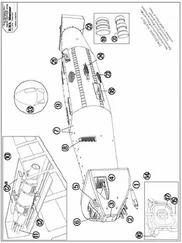"He's right," Anton said. "Those guesstimates, as you call them, were produced by me and Ruth working independently of each other. Victor provided us with his own estimates, as well, although those were a lot less rigorous. We didn't match the results until all three of us were finished. Then Ruth crunched the numbers every way possible—using nothing but Victor's numbers, then nothing but mine, then nothing but hers, then every possible combination of the three. Not a single one of those calculations produced a result that was off by more than fifty percent from the numbers produced as an overall average. To hell with false modesty, Jeremy. You'd be hard pressed to find two intelligence agents anywhere in the galaxy who are better than Victor and I are at this business, and Ruth is as good an analyst as almost anyone in ONI."
Jeremy raised a hand pacifically. "I'm not disputing that," he said. "So what you're saying, in essence, is that there's no way you could be misreading the figures?"
"Oh, I'm sure we are misreading them," said Victor. "As you say, we have no direct access to Manpower's records. But we can't be misreading them enough. We just can't, Jeremy. Whatever the exact figures might be, we're close enough to be certain that Manpower's covert activities over the past period can't possibly be explained as the behavior of a business enterprise using any conceivable business model, no matter how ruthless and unrestrained by morality it might be."
"But you just said yourself that they'd at least break even—and might wind up making a fortune off the revenues from the Lynx Terminus."
Ruth got a very self-satisfied look on her face. "Yes—but that's not really the point. Oh, I'll bet the rest of the galaxy's busy looking at it exactly that way right this minute, but there are two other factors I think—Anton and I think—they should be looking at, instead."
"And those are?"
"First, no matter who fronted the cash—Manpower or Technodyne—the fact remains that very few corporations in history have ever thrown such huge resources into speculative endeavors as risky as the Monica project. Oh, there've probably been at least a few private venture operations with this kind of price tag, given the scale the big transtellars operate on. All those battlecruisers together didn't cost much more than a couple of superdreadnoughts all by themselves, after all, even if they had to pay full price for them. And when you stack that up against something like, say, TranStar of Terra's infrastructure project in Hiawatha, it starts looking downright picayune. But the risk factor in this case was way outside any standard operation. Especially one that was unsecured. TranStar got a huge chunk of its expenses guaranteed upfront by the League before it ever sent the first survey crew into Hiawatha, and that sure as hell didn't happen here! If everything had worked, they'd have made a fortune. But if anything went wrong—which, after all, it did—they were going to get exactly zilch back on whatever they put into the effort. That's what's so far outside the standard models."
"Corporations are intrinsically conservative when it comes to things like this, Jeremy," Anton put in. "That's why no longterm, really expensive projects that don't have a definite payoff within a reasonably short and specified time frame are ever undertaken by private corporations— unless they have solid government backing and some pretty hefty government guarantees."
"Yeah!" Ruth nodded energetically. "And that brings us to the second thing I think everybody should be considering here. If the primary goal was to kick the Star Kingdom off of Mesa's front step—and that's what everything seems to be indicating—then the possible payoff for grabbing the terminus was entirely secondary, right? I mean, we're postulating that profit wasn't the primary motive."
"Some people are, at any rate," Jeremy replied, then shrugged. "All right, and I'll grant you that all the internal evidence we've seen so far suggests the same thing. But that doesn't mean profit couldn't have been a really important secondary motive!"
"Sure. But they could've accomplished both of their objectives a lot more cheaply, Jeremy, and without doing something so likely to screw up their relations with the League. All they had to do was keep supplying people like that lunatic Nordbrandt, on Kornati, or even Westman, on Montana. If they'd done that, and managed to find a few other hotspots to keep stirred up, they could have kept us tied up dealing with 'local unrest' for years . And that's assuming it didn't make enough domestic stink back in Manticore to make us just decide it was all a bad idea in the first place and go home again. Might not have gotten us to let go of the terminus, but if it went on long enough, it'd probably have gotten OFS involved, and that was really more or less what they had in mind in the first place. Which doesn't even consider the fact that someone back in the League was eventually going to figure out where Monica's new navy came from. Subsidizing terrorists is one thing, as far as the League is concerned; handing its starships over to a bunch of neobarbs was way too likely to be something else entirely. So it's not just how much they were willing to put up against the possible gains, it's also that they had another, cheaper—and safer —alternative. And it was an alternative they damned well knew about, because they were pursuing it at the very same time!"
Jeremy still looked skeptical, but Du Havel was nodding. "They're right, Jeremy, as far as it goes—and if I needed to, and had the spare time, I could easily write a book showing how that pattern has been consistent throughout history. To go back to pre-Diaspora times, for instance, railroads and canals—even a lot of toll roads—weren't built unless the companies involved had gotten some sort of backing or incentives from whatever governments were in place at the time. That said, however, before we leap to any conclusions, we should remember Napoleon's dictum."
"Who's Napoleon?" asked Berry.
"Bernice Napoleon. She's the minister of system defense for Eta Cassiopeiae," said Ruth. For someone as young as she was, the Manticoran princess's knowledge of astropolitics was phenomenal.
"I think Web's referring to an ancient conqueror," said Zilwicki. "But the only dictum I can remember associated with him is something about an army marching on its stomach, which seems pretty irrelevant here."
" 'Never ascribe to malice that which is adequately explained by incompetence,' " said Victor. "I first heard it from Kevin Usher. He practically dotes on the quip."
Ruth was looking puzzled again. "And what is that supposed to . . . Oh."
"Web is raising the possibility that Manpower's behavior might simply be the product of mismanagement," said Anton.
"Yeah, I figured it out," Ruth said. Her eyes got a bit unfocused. "You know . . . I could probably crunch those numbers, too. Even here on Torch, the data bank we've been able to compile is enormous. There should be enough in there for me to run models using figures from companies that went bankrupt."
"Don't bother," said Zilwicki. "I've run models close enough to those in the past. Even assuming the worst case variant—a private company run by a single individual with no internal restraints of any kind, which doesn't resemble Manpower at all—you still won't get numbers anything like this. These are the sort of outlays measured against possible gain that you only get from governments. And aggressive governments, at that. The sort led by your Alexander the Great types. Not bean-counters."
"Why in the world would you have taken the time to develop such models?" asked Cachat. "I can't think of any reason to do so."
Читать дальше












